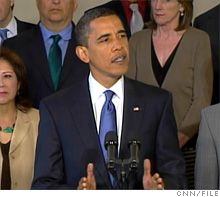Obama: We can afford health care reform
President proposed $313 billion in cuts to Medicare and Medicaid to help pay for $1 trillion health care reforms.

WASHINGTON (Reuters) -- President Barack Obama Saturday proposed an additional $313 billion in cuts to Medicare, Medicaid and other programs to pay for health care reforms expected to cost about $1 trillion over the next decade.
"I know some question whether we can afford to act this year. But the unmistakable truth is that it would be irresponsible to not act," Obama said in an advance text of his weekly radio address.
Obama wants a health care reform bill on his desk by October, but faces opposition from Republicans who oppose creation of a government-run insurance plan to compete with private insurers.
Many of his fellow Democrats are wary of making deep cuts to Medicare and Medicaid, the U.S. health care programs for seniors and poor people, to pay for reforms.
With the cost of U.S. health care continuing to rise rapidly, Obama argued the country could not afford to wait another year for sweeping changes.
But he acknowledged the ambitious plan would increase government costs in the short run.
To address those concerns, Obama has pledged to come up with enough spending cuts and new revenue to pay for reforms.
"So today, I am announcing an additional $313 billion in savings that will rein in unnecessary spending, and increase efficiency and the quality of care -- savings that will ensure that we have nearly $950 billion set aside to offset the cost of health care reform over the next ten years," Obama said.
About $110 billion of the new cuts would come from reducing scheduled increases in Medicare payments. That would encourage health care providers to increase productivity, White House budget director Peter Orszag told reporters.
Obama also proposed cutting payments to hospitals to treat uninsured patients by $106 billion on the assumption those ranks would decline as health care reforms phase in.
An additional $75 billion would come from "better pricing of Medicare drugs," Orszag said, adding the White House was in talks with stakeholders over the best way to do that.
The remaining $22 billion in proposed cuts would come from smaller reforms, such as adjusting payment rates for physician imaging services and cutting waste, fraud and abuse.
The new cuts are in addition to a $635 billion "down payment" on health care reform that Obama outlined in his budget to Congress earlier this year.
About half of that came from cuts in Medicare and Medicaid and the rest from revenue proposals such as cutting tax deductions for families that make over $250,000 a year.
Altogether, the Obama administration is now asking Congress to trim spending on Medicare and Medicaid by more than $600 billion over the next decade, which is more than some Democrats are willing to swallow.
House Ways and Means Committee Chairman Charles Rangel told reporters after a closed-door meeting with fellow Democrats on the panel that the committee would include about $400 billion in Medicare and Medicaid savings in the health care overhaul legislation being drafted.
"We don't think we can do all the things he (Obama) is recommending. ... We think his 600 (billion) is our 400," Rangel told reporters. ![]()

